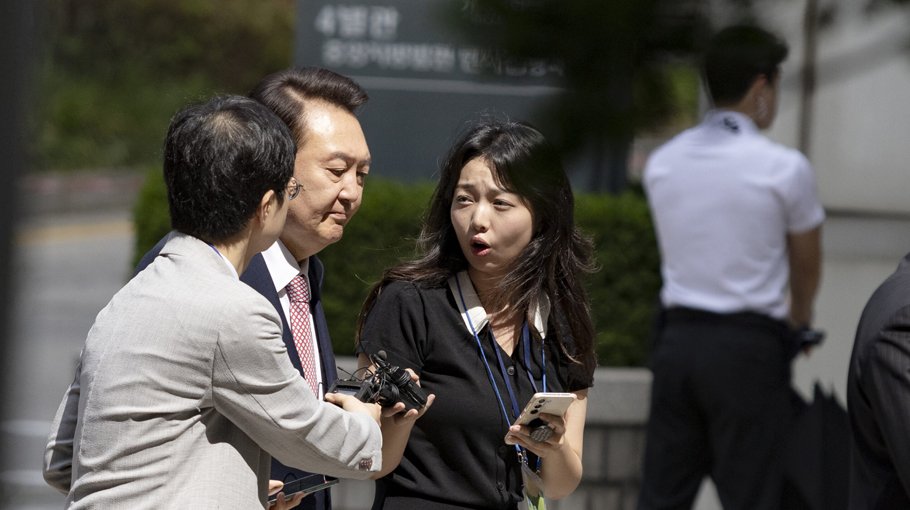South Korea’s democracy in the shadow of the far-right

Ming Gao
On 4 April 2025, South Korea’s Constitutional Court unanimously ruled to remove the impeached president Yoon Suk-yeol, claiming he ‘violated the constitutional order and posed a serious threat to the Democratic Republic’. In the aftermath, South Korea faces a far-right surge emboldened under Yoon, along with the lingering structural crises that enabled it.
The immediate trigger of the impeachment was Yoon’s declaration of martial law on 3 December 2024 following his party’s parliamentary defeat. Yoon cast himself as the defender against ‘pro-North, anti-state forces’, galvanising a far-right base that stormed courts, threatened judges and called the impeachment a foreign plot.
What distinguished this episode was not just Yoon’s actions but the ruling People Power Party’s (PPP) endorsement, as it echoed Yoon’s claims and courted far-right groups.
These far-right groups differ from South Korea’s traditional conservatives in both origin and orientation. While earlier conservatives largely operated within constitutional norms and prioritised growth, stability and national security, these groups blend reactionary populism with conspiracies, cultural grievance and hostility towards liberal democracy. This constituency is defined less by coherent ideology than by the affective mobilisation of anti-feminism, anti-immigrant — particularly anti-Chinese — sentiment, religious nationalism and the rejection of pluralism for moral absolutism. Unlike traditional conservatives who sought elite consensus, far-right actors in 2025 mobilise outside institutional frameworks through churches, online platforms and street protests, framing opponents as existential enemies.
Once marginal, far-right forces gained traction amid economic precarity, demographic change and cultural liberalisation. Their rise under Yoon signalled a shift from institutional conservatism to a politics of siege, resentment and authoritarian temptation — one that continues to reshape South Korea’s political landscape beyond his removal.
Two key demographics are behind this far-right surge. A ‘forgotten generation’ of elderly citizens and angry young men in their 20s and 30s — the so-called ‘2030’ generation. The collapse of traditional social structures and inadequate welfare have left older citizens — with the highest elderly poverty rate among OECD countries — feeling abandoned by the very society they helped build. Meanwhile, many young men faced with stagnant wages, job insecurity and mandatory military service have grown increasingly resentful of feminism, drifting towards conservative views. These groups form the backbone of a reactionary movement that translates personal frustration into nationalistic rage.
Statistics from the June 2025 presidential election are revealing, particularly for the ‘2030’ generation. 74.1 per cent of men in their 20s and younger backed either the PPP candidate Kim Moon-soo or the minor conservative Reform Party candidate Lee Jun-seok — a sharp 15-point rise from 2022 — while 60.3 per cent of men in their 30s did the same. Liberal candidate Lee Jae-myung secured just 24 and 37.9 per cent support from these respective groups. In turn, almost 60 per cent of female ‘2030’ voters backed Lee Jae-myung, highlighting a widening gender divide.
Religion has also played a central role in the far-right’s rise. Conservative Protestant churches, particularly US-aligned evangelicals, have become hubs of far-right activism. Mobilising anti-LGBTQ+ rhetoric and Cold War anti-communism, they offer an emotionally charged, theologically justified framework for rejecting liberal politics. Jeon Kwang-hoon, a far-right pastor, held rallies praising Yoon using the slogan ‘Save Korea’ and urged followers to mobilise 30 million people against the impeachment. Events like the Taegeukgi rallies similarly combined patriotic symbols, religious hymns and political slogans, creating a space where personal faith and nationalist politics reinforce each other.
The PPP’s alliance with such groups is a dangerous gamble. In trying to salvage its power, the party has legitimised actors who reject the basic tenets of democracy. This mirrors trends in the US Republican Party, where a similar embrace of far-right extremism has eroded institutional norms and intensified political polarisation. Yoon’s impeachment may have halted a descent into autocracy, but it has not resolved the deeper crisis — the mainstreaming of far-right ideologies, the collapse of a moderate conservative alternative and the failure of progressives to build a broad, inclusive coalition.
The Lee Jae-myung administration starting in June 2025 faces the challenge of recalibrating South Korea’s foreign policy within a volatile region while navigating domestic polarisation. Lee has pledged national unity and shifted from progressive to centrist-left, emphasising the US alliance and trilateral cooperation with Japan. But his consensus stance risks further weakening the country’s progressive forces, leaving no counterbalance to the radicalised right. This is amid mounting external pressure, particularly with renewed US efforts under President Donald Trump to leverage Northeast Asia against China. Without credible alternatives to far-right currents, South Korea risks undermining its diplomatic consistency and strategic credibility.
What happens next depends not only on the elites but also on the public. As the Constitutional Court acknowledged, it was citizen resistance and institutional non-compliance that thwarted Yoon’s self-coup. Ordinary citizens demonstrated that South Korea’s democratic spirit remains resilient. Yet resilience alone is not enough. The structures that produced this crisis — neoliberal inequality, generational alienation, gender divide and a radicalised religious right — are still firmly in place.
Ming Gao is Researcher of East Asian Studies in the Department of History at Lund University, Sweden.
Yoon’s impeachment and Lee’s election are only the beginning of a much longer and harder struggle to rebuild trust in institutions and ensure that constitutional democracy remains a lived reality. In that struggle, the courage of citizens may again prove to be South Korea’s greatest defence.



